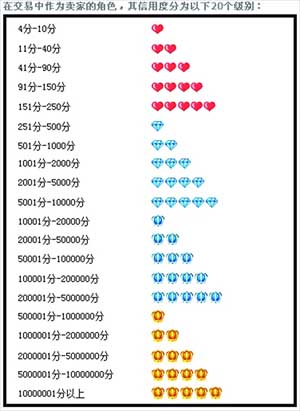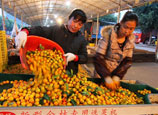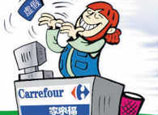
 |
| Ratings are so important to both sellers and buyers but some shady ratings may spoil the function. Photo: taobao.com(GT) |
People who are tempted to take advantage of the cool prices on Taobao, China's largest online retailer, this gift-buying season should be aware of the claims made by sellers.
Can you trust hot items, labeled "sold 10,000 madly in one month" with lots of positive feedback from other users? There might be professional reviewers behind them.
You may lose out on some really keen stuff if you just rule out the items with any bad assessments, because those actually might be from people hired to give negative reviews.
One might wonder about those professional reviewers - is it a real thing, and how much damage have they done to the Taobao review system?
On November 29, Taobao announced that it had cracked down for the first time on rating slander, according to a previous report of the Global Times on November 30.
In that case, seven suspects were accused of giving negative ratings on purpose, and even extorting Taobao shop owners.
Many shop owners have been harassed by those people. The owner of Sadama, a shop selling women's clothing, surnamed Xiao, is one of them.
Last September, somebody gave Sadama negative ratings, without ever trying to communicate with Xiao directly or pointing out what was wrong. During a negotiation over the phone, the buyer threatened Xiao that her ratings would take a hit unless he was given a certain amount of money.
"He was a professional," Xiao said. "They want to make a profit out of this!" Xiao said.
Though Xiao stood firm the first time, a few days ago, the store got another malicious assessment. This time she paid 10 yuan to get rid of it.
Many owners like Xiao end up paying the ratings bullies to make them go away because they cannot afford to have bad reviews. Positive feedback is an important reference point for buyers, and is directly linked to sales.
But many owners hire faux purchasers to make an item seem to have booming sales to attract buyers, and the assessors receive payment for giving favorable comments.
For Taobao users, the fakers make it hard to tell what feedback is real and deserved.
Amelia Yao, a 27-year-old white-collar worker, has her own way of navigating the corrupted system. With eight years' experience of purchasing on Taobao, Yao is a senior buyer with 1,292 successful purchases under her belt. "They (the false reviewers) make no difference for me," Yao said.
Yao estimates she's spent 150,000 yuan ($24,060) on Taobao, purchasing mainly clothes, cosmetics and shoes. Yao has some tips for identifying the faulty reviews.
1. Trust the feedback from the diamond-level buyers (with more than 250 completed purchases). If one item is favorably assessed only or mostly by "heart-level" buyers (less than 250 purchases), it's very possible that it's coming from a professional rater.
2. Check the buyer's account to see what they bought. If they buy things with extremely different price ranges or in totally unrelated categories, they're probably a professional.
3. If a buyer gives supplementary comments a long time after they made the previous one, they're usually an honest buyer who actually tried the product and wanted to contribute useful feedback.
4. If the seller has only one item with hot sales in their history, beware of the greedy hand writing their reviews.
5. If a seller has gone above and beyond to present a horrifically bad assessment and write a long paragraph about how it's extremely unfair to get a bad rating with his good service, you can go ahead and trust him as a victim of professionals.
Metro Beijing has also put together some helpful tips:
6. If the assessment is a bit spare on pertinent information, using bland works like "good," "nice" or "like it," it's probably a fake review.
7. If one buyer purchases several of the same item, and gives each piece a different positive assessment, they're definitely employed by the shop selling it.
8. A fake review can venture into the melodramatic, such as, "My girlfriend looks like a goddess in this." Come on, it's just a 15-yuan vest!














 Cumquat market in S China's Guangxi
Cumquat market in S China's Guangxi


![]()
